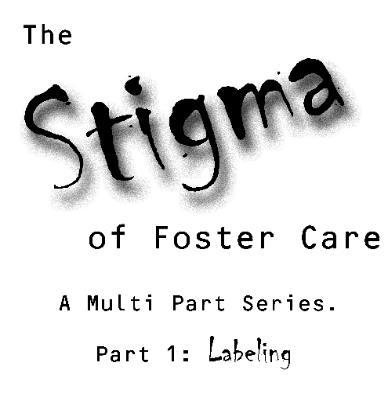
"Johnny is quite fidgety, he has trouble staying focused." "Debbie seems
to have some anger issues, more than likely caused by her recent transition."
"Mike is having trouble adjusting." Involvement in care means you will
absolutely hear phrases like this. One of the first steps in most Foster Care
scenarios is the evaluation of the child's personality and mental disposition,
its imperative that everyone knows exactly what they are working with.
In most cases, this process is informal and is merely a fact-finding conversation.
A one on one situation is the norm and bears the most positive results. The
objective, right or wrong is not to place the child in a category. A good, normal
kid is obviously the most sought after results, although more times than not,
these are not the outcomes. So for the 30% or better, of those that do not fall
into this category with a clean bill of health, a lot of questions need answered.
The reigning champion of diagnoses has held the title for more than twenty
years, and of course, we are talking about ADD/ADHD. ADHD, or attention
deficit hyperactivity disorder, used to be known as attention deficit disorder, or
ADD. In 1994, it was renamed ADHD. The term ADD is sometimes still used,
though, to describe a type of ADHD that doesn't involve hyperactivity.
ADHD is a medical condition that affects how well someone can sit still, focus, and pay attention. People with ADHD have differences in the
parts of their brains that control attention and activity. This means that they may have trouble focusing on certain tasks and subjects, or they
may seem "wired," act impulsively, and get into trouble.
The reason ADD/ADHD is diagnosed so frequently is that to one extent or another most of us have some symptoms or combination of
symptoms that could easily translate to a label of ADD/ADHD for even the most seasoned professional. Efforts have been made to curb the
number of ADD/ADHD diagnoses and they have in fact trended down slightly.
A new up and coming label for kids, is OCD or obsessive-compulsive disorder. OCD is a type of anxiety disorder. People with OCD become
preoccupied with whether something could be harmful, dangerous, wrong, or dirty - or with thoughts about bad stuff that might happen. With
OCD, upsetting or scary thoughts or images, called obsessions, pop into a person's mind and are hard to shake. People with OCD may also
worry about things being "out of order" or not "just right." They may worry about losing "useless" items, sometimes feeling the need to collect
these items.
People with OCD feel strong urges to do certain things repeatedly - called rituals or compulsions - in order to banish the scary thoughts, or to try
to ward off the bad thing they dread, or to make extra sure that things are safe or clean or right. By doing a ritual, someone with OCD is trying
to feel absolutely certain that something bad won't happen
OCD is a popular diagnosis whose symptoms are closely related in some aspects with those of ADD/ADHD. There are some who believe that the
decline in ADD/ADHD cases can be directly linked with the increase in OCD cases.
Bear in mind that the understanding of a child and/or care provider is imperative to the foster care process. Without some sort of fuel for or
diagnosis of the participants involved it makes for difficulty in problem management as well as many more issues that would hinder the care
process.
Of the other labels applied to children in care, most are considered nearly non-issues. Common social disorders like shyness, nervousness and
isolation issue are all considered manageable with little to no effort and in most cases, the child makes the necessary adjustments and grows out
of what some professionals consider minor character flaws. (Serious disorders, bi-polar, schizophrenia)

 Owner/Editor - Chris Chmielewski
Owner/Editor - Chris Chmielewski